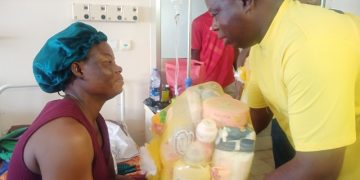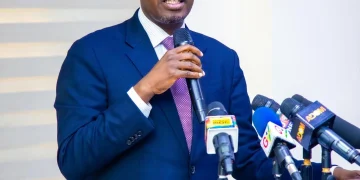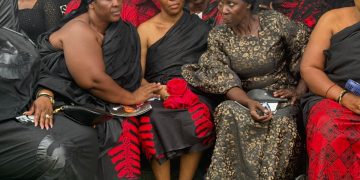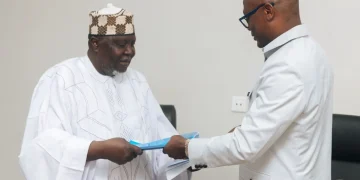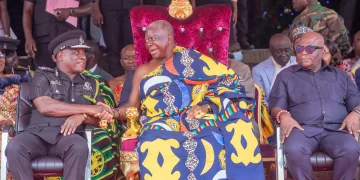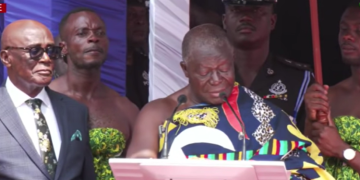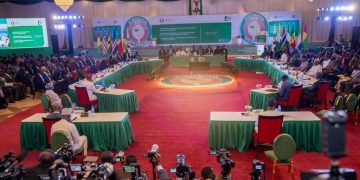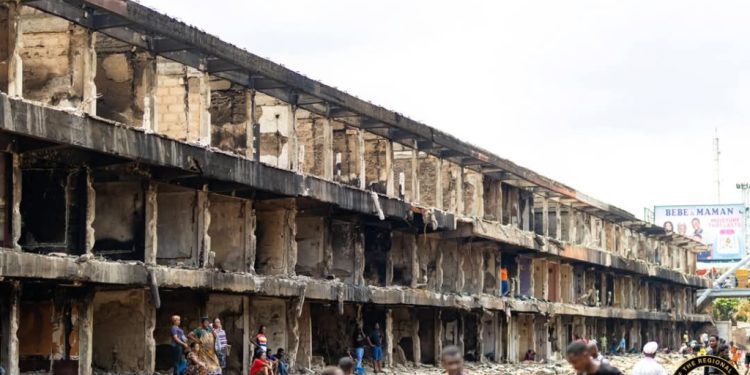The inferno that swept through Kumasi BlueLight trading area, razing shops, wares, and decades of livelihoods to ashes is a tragic narrative. Smoke gave way to silence, and silence gave way to tears and despair.
The genuine victims, traders predominantly young individuals, were forced to assess their losses and cling to the remnants of their hard-earned investments.
For many, it was not just a shop that burnt; it was their daily bread, their children’s school fees, and their only chance at survival. Their livelihood.
But just as the smoke dissipates, the Bluelight is witnessing another kind of heat. Politics. One by one, politicians of various stripes descended on the charred site with camera crews, press secretaries, bloggers, and media entourage in tow.
With solemn faces and carefully choreographed frowns, they posed beside the debris, shook hands with wailing victims, and made grand pledges of support. Some brought bags of rice, oil, streetlights, cash envelopes, and a few left behind promises. The question on my mind is simple: is it about the ‘object or the optics, sympathy or strategy?’ Are these visits about genuine support, or are they stage-managed acts of political theatre? Is the intent truly to restore livelihoods, or to restore public image?
If history is any indicator, the answer leans heavily toward the latter. Kumasi Central Market, Kejetia or Asafo is no stranger to fires and neither is Ghana. Each time, politicians show up, sometimes with photographers arriving before the actual donors. Speeches are made, headlines are secured, and yet the victims are often left to rebuild their lives with zero state intervention. Promises of support fade as quickly as the media spotlight, and the victims, who were once front-page material, are forgotten until the next disaster.
What makes this cycle even more painful is the sheer predictability of it. We have seen these before: In 2018, politicians pledged to support victims of Central Market after a similar fire. Months later, most victims said they never received a cedi. 2020, Accra Kantamanto fire: Donations were televised, but follow-up investigations showed that many traders had to rely on personal loans to restart. 2023, Kejetia Market blaze: Once again, solemn visits, interviews, and support pledges, but real recovery was left in the hands of the victims.
Don’t get me wrong. This is not to diminish the humanity of every political figure; some may indeed have good intentions. But the pattern remains suspect. If donations are truly acts of compassion, why are they timed with media appearances and party supporters? Why do politicians only arrive after the cameras and party sympathizers have? Why is there no structured, institutional disaster relief fund accessible to traders without the need for handshakes and photo-ops?
In most modern economies, emergency support is a right, not a favour. It is built into systems, with rapid-response teams, insurance schemes, and state agencies trained to act within hours. Here in Ghana, disaster recovery has become a performance. And the stage is always the same: a crowded market, a weeping trader, a politician’s convoy, a donation envelope, and a press release.
This transactional sympathy not only trivializes the pain of victims but also erodes public trust in leadership. It transforms governance from service to spectacle. And it deepens the cynicism many Ghanaians already feel toward politics, a space where optics often matter more than outcomes.
The traders at BlueLight do not need sympathy visits. They need real policy change: access to microinsurance, fire safety infrastructure, credit schemes with fair interest rates, and market reconstruction plans that center the needs of the working poor. They need systems, not selfies.
If our leaders are truly concerned, let them go beyond the optics. Let them push for a Traders’ Relief Fund, institutionalized within the budget. Let them demand a nationwide audit of market fire safety standards. Let them put policy where their cameras can’t reach. Until then, we will ask again, object or optics?
If charity is done only in front of cameras, is not compassion. It is campaigning.
Source: Kwame Adinkrah Broadcaster







